April 20, 2025 | 09:25 GMT +7
April 20, 2025 | 09:25 GMT +7
Hotline: 0913.378.918
April 20, 2025 | 09:25 GMT +7
Hotline: 0913.378.918
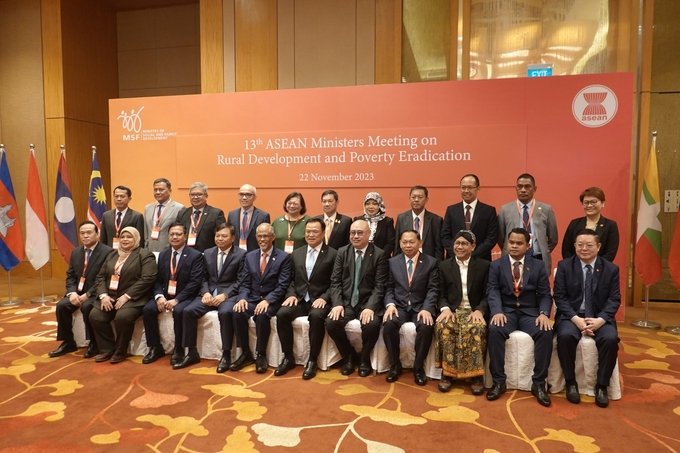
The 13th ASEAN Ministerial Meeting on Rural Development and Poverty Eradication on November 22.
On November 22, the 13th ASEAN Ministerial Meeting on Rural Development and Poverty Eradication was held in Singapore. High-ranking representatives from ASEAN countries (excluding Myanmar) and ASEAN Secretary-General Dr Kao Kim Hourn attended. Chaired by Minister for Social and Family Development of Singapore Masagos Zulkifli, the meeting discussed key strategies to leverage regional cooperation to advance inclusive and sustainable development to eradicate poverty in the region. They also explored ways to strengthen community-based approaches and social protection for poverty alleviation across ASEAN.
Recognized during the Senior Officials Conference on Rural Development and Poverty Reduction (SOMRDPE), Vietnam stands out as a success story in the realm of social security policies, catalyzing positive transformations in rural village landscapes. During the meeting, Vietnam expressed gratitude to ASEAN member states and the ASEAN Secretariat for their consistent support and assistance throughout Vietnam's SOM Chairmanship for the 2022-2023 period, culminating in the smooth transition of leadership to Singapore.
ASEAN's collaborative efforts on rural development and poverty reduction are proving effective, contributing to the overall prosperity of the ASEAN region. Vietnam actively and responsibly participates in the management network, aligning efforts to meet the established goals.
Deputy Minister Nguyen Hoang Hiep, representing the Ministry of Agriculture and Rural Development, shared at the meeting, "Vietnam values the proactive spirit and efforts of ASEAN member states, along with international partners and organizations, in implementing activities outlined in the Action Plan Framework on Rural Development and Poverty Reduction for the period 2021-2025. Moving forward, we anticipate increased emphasis from ASEAN countries and international organizations on community-based approaches and social protection to eliminate hunger and alleviate poverty."
Additionally, Deputy Minister Nguyen Hoang Hiep outlined the Agriculture and Rural Development Strategy for 2030 and the vision for 2050, as approved by Prime Minister Pham Minh Chinh. The strategy advocates for agricultural restructuring, emphasizing a shift from "production thinking" to "economic thinking" with a focus on "green values" derived from "green transformation, green consumption, and a green economy."
Vietnam is successfully implementing the National Target Program for Sustainable Poverty Reduction for the period 2021-2025, aiding rural communities in breaking free from poverty and enhancing their quality of life. Midway through the Program's execution, the number of impoverished households has decreased in line with the targeted goals, denoting initial successes. People have proactively exerted efforts to uplift themselves from poverty, engaging in organized production, animal husbandry, and cultivation activities to establish livelihoods and income streams tailored to the specific conditions of each locality.
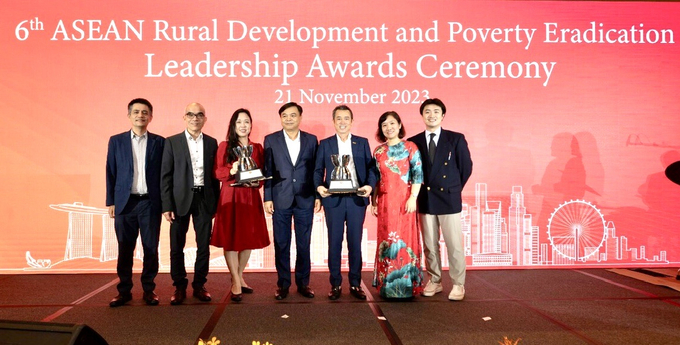
The ASEAN Awards to organizations and businesses for their substantial contributions to the community.
During an award ceremony recognizing organizations and businesses for significant contributions to the community, Deputy Minister Hiep emphasized that Vietnam, in its development journey, prioritizes aligning national-level activities with the objectives outlined in the Action Plan Framework on Rural Development and Poverty Eradication for the period 2021-2025. Vietnam aspires to progress towards sustainable rural development, intricately tied to the overarching goal of reducing multidimensional poverty, reinforcing social security and protection, and contributing to hunger eradication and poverty reduction, leaving no one behind. Collaboration within ASEAN on Rural Development and Poverty Reduction is envisioned to generate fresh momentum and opportunities for sustainable rural agricultural development, ensuring food security across the entire ASEAN region.
Before the Ministerial meeting, the Secretary-General of ASEAN and the Minister of Social and Family Affairs of Singapore presented the 6th ASEAN Awards to organizations and businesses for their substantial contributions to the community. The Award is one of the ways in which ASEAN recognizes the outstanding efforts of civil society organizations and the private sector in promoting inclusive and sustainable rural development. These entities has actively contributed to rural development, hunger eradication, and poverty reduction, fostering livelihoods in rural areas and supporting social security. Among the recipients were two representatives from Vietnam: the Vietnam Institute for Rural Industry Research and Development (VIRI) and Vinh Hiep Company Limited.
Looking ahead, the 14th ASEAN Ministerial Conference on Rural Development and Poverty Reduction is scheduled for 2025 in Thailand. Vietnam is poised to assume the Chairmanship and host the ASEAN Ministerial Conference on Rural Development and Hunger Eradication and Poverty Reduction by 2027.
Translated by Quynh Chi

(VAN) The Central Veterinary Diagnosis Center (Department of Livestock Production and Animal Health) has proposed tightening the mechanisms for monitoring and ensuring transparency in the testing information provided by private laboratories.
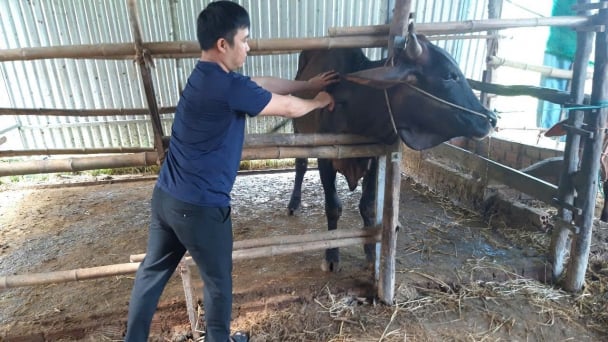
(VAN) Not only does vaccination protect livestock against dangerous diseases, but it also brings sustainable economic benefits to farmers.

(VAN) Since the beginning of the year, Dong Nai has recorded 8 rabies outbreaks, resulting in 2 deaths due to unvaccinated dogs being let loose on the streets.
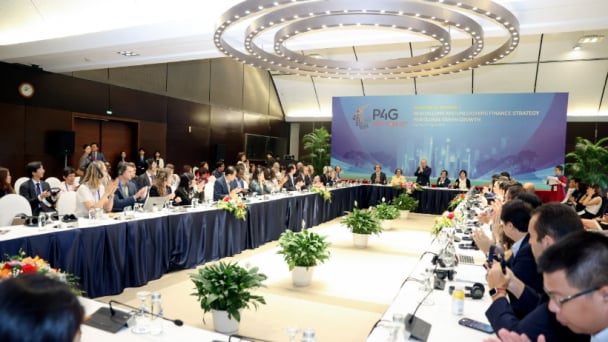
(VAN) Green finance needs to undergo global reform to ensure capital flows to the right places, at the right time, and supports a just green transition.
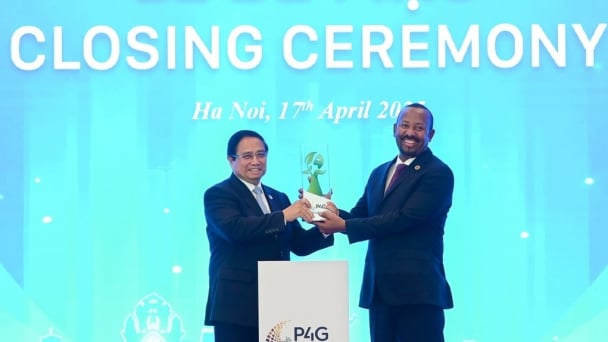
(VAN) On the afternoon of April 17, Prime Minister Pham Minh Chinh chaired the closing ceremony of the P4G Vietnam Summit 2025, with the theme 'Sustainable and People-Centered Green Transformation.'
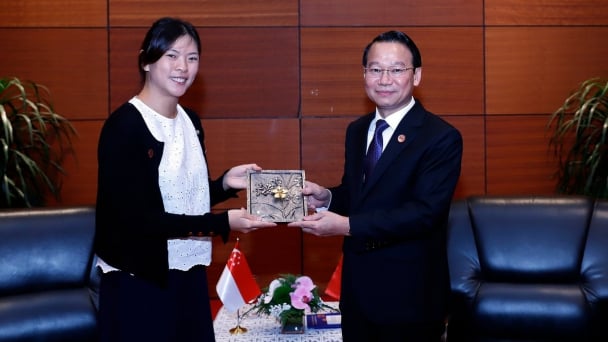
(VAN) Vietnam and Singapore are poised to sign the Paris Agreement and collaborate on implementing large-scale renewable energy projects that are mutually beneficial.
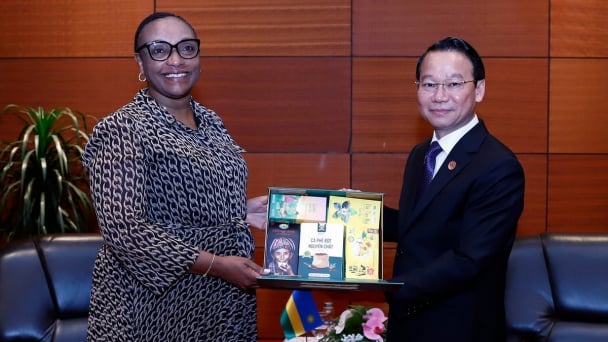
(VAN) Vietnam and Rwanda agreed to promote agricultural and environmental cooperation towards green growth and sustainable development in the new period.